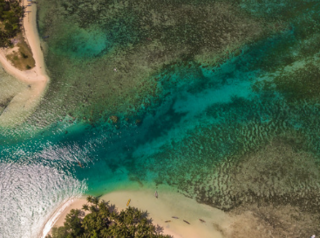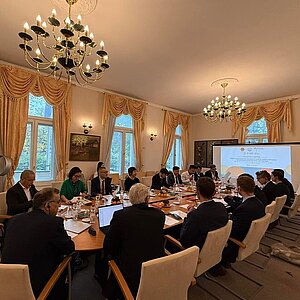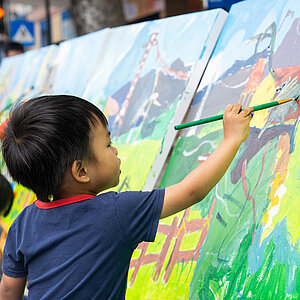Global Biodiversity Outlook 5

In September, the CBD Secretariat presented the fifth Global Biodiversity Outlook. The report shows just how far away we are from living in harmony with nature.
The fifth issue of the flagship report from the Global Biodiversity Outlook (GBO-5), presented in September by the Secretariat of the UN Convention on Biological Diversity (CBD), clarifies the action needed to achieve the vision of ‘Living in Harmony with Nature’ for 2050. As the report makes clear, unfortunately, we are still very far from achieving this vision.
GBO-5 presents a sobering summary of the state of biodiversity on our planet. Not one of the 20 Aichi Biodiversity Targets agreed ten years ago has yet been achieved in its entirety. The CBD Secretariat identified achievement of at least some target elements for only six targets. Examples here include a reduction in rates of global deforestation, the protection given to key biodiversity areas and a number of avian and mammal species, and improvements to the rights of women in terms of land usage and ownership.
A total of 1.7 ‘Earths’ would be needed to regenerate the biological resources that were exploited by humankind between 2011 and 2016
The report simultaneously provides an important basis for the new global framework for biological diversity after 2020, known as the ‘Post-2020 Global Biodiversity Framework’. Germany will be working with its partners in the post-2020 framework negotiations to secure ambitious targets and an increased focus on implementation, aiming to achieve the transformative change that is needed for long-term protection of the planet’s biological diversity. International Climate Initiative (IKI) also has an important role to play here in providing support to partner countries for the drafting and implementation of their national biodiversity strategies, and helping them to achieve their CBD targets.
The GBO-5 report presents a number of pathways aimed at realising the vision for 2050 of ‘Living in Harmony with Nature’. To achieve this, the CBD has identified eight ‘Transitions to sustainable pathways’, required in eight aspects of the interface between human activity, human well-being and nature. These include:
- Land and forests transition: Intact ecosystems are conserved and restored, and the maintenance of food security is no longer linked to the large-scale conversion of forests and other ecosystems;
- Sustainable freshwater transition: An integrated approach to guarantee the water sources required by nature and people. Improving water quality, protecting critical habitats, controlling invasive species, and safeguarding connectivity to allow the recovery of freshwater systems;
- Sustainable fisheries and oceans transition: Protecting and restoring marine and coastal ecosystems, rebuilding fisheries and managing aquaculture and other uses of the oceans to ensure sustainability, and to enhance food security;
- Sustainable agriculture transition: Redesigning agricultural systems through agro-ecological and other innovative approaches, so as to enhance productivity while minimising negative impacts on biodiversity;
- Sustainable food systems transition: Sustainable and healthy diets with a greater diversity of foods, mostly plant-based. Reductions in the consumption of meat and fish, and dramatic cuts in the waste involved in the supply of food;
- Cities and infrastructure transition: Deployment of ‘green infrastructure’ and providing space for nature within built landscapes to improve health and quality of life for citizens, and to reduce the environmental footprint of cities and infrastructure;
- Sustainable climate action transition: Employing nature-based solutions and a more rapid phase-out of fossil fuel use to reduce impacts in relation to climate change;
- Biodiversity-inclusive one health transition: Managing ecosystems, including agricultural and urban ecosystems, as well as the use of wildlife, through an integrated approach, to promote healthy ecosystems and healthy people.

How IKI is supporting ‘Living in Harmony with Nature’ worldwide
International Climate Initiative (IKI) is fostering these pathways with a range of projects that focus in particular on global biodiversity conservation. Some of these are presented below.
Land and forest transition
With the project ‘TEEB implementation – assessment of ecosystem services for holistic and sustainable land management in the agricultural sector’, the IKI is promoting the improved economic evaluation of ecosystem services, to be used as input for land usage decisions.
Sustainable freshwater transition
In India, the IKI project ‘Wetlands management for biodiversity and climate protection’ is supporting ecosystem protection as well as the application of ecosystem-based measures to improve the resilience of these areas and the living conditions of the local population.
Sustainable fisheries and oceans transition
In the project ‘Fishing for climate resilience: empowering vulnerable, fisheries dependent communities adopt ecosystem-based-adaptation measures to secure food and livelihoods’, IKI is funding ecosystem-based adaptation measures in Indonesia, the Marshall Islands, Micronesia, Palau and the Philippines. These measures aim to protect coastal ecosystems in order to secure the ecological, social and economic resilience of local communities.
Sustainable agriculture transition
The IKI-funded project ‘Conservation of pollinator diversity for enhanced climate change resilience’ is helping to protect bees, wasps, flies, beetles and butterflies in Morocco as key elements of sustainable agriculture, while also establishing the ‘Agriculture with wild pollinators’ approach.
Cities and infrastructure transition
Urban areas are also addressed by IKI projects. An example is the ‘Morgenstadt Global Smart Cities Initiative: Global approach - local solutions’ project that is using the ‘city labs’ format to develop integrated strategies and roadmaps for sustainable urban development in selected pilot cities in India, Mexico and Peru.
Sustainable climate action transition
In Indonesia, Thailand and Viet Nam, IKI is using its project ‘Clean, affordable and secure energy for Southeast Asia (CASE)’ to support an energy transition with ambitious climate goals. The project has secured the involvement of a broad spectrum of relevant stakeholders to develop evidence-based solutions to core challenges and is also setting up a knowledge platform.
Biodiversity-inclusive one health transition & Sustainable food system transition
The ‘one health’ approach is now an increasingly important topic for IKI. This approach acknowledges the link between biodiversity and climate change, and is responding to new global challenges with an integrated approach to promote healthy ecosystems and healthy people. This includes the sustainable production of food as well as sustainable supply chains.
The link has been copied to the clipboard
Contact
IKI Office
Zukunft – Umwelt – Gesellschaft (ZUG) gGmbH
Stresemannstraße 69-71
10963 Berlin

















![[Translate to English:]](/fileadmin/_processed_/1/7/csm_20220302_China_Braunkohle_iStock-1156726052_Wang_Meng__d08d9b7cab.jpg)

